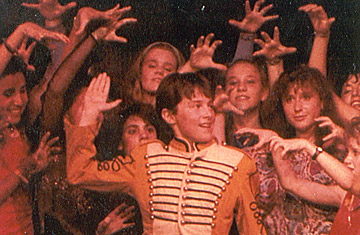
A young Zach Braff performs at Stagedoor Manor, a theater camp located in Loch Sheldrake, N.Y.
At age 31, Mickey Rapkin packed his bags and headed to summer camp. But it wasn't just any camp — it was Stagedoor Manor, one of the nation's most prestigious theater camps, located in upstate New York. This was where Robert Downey Jr. played Mr. Deusel in a 1976 production of The Diary of Anne Frank, Natalie Portman performed Cabaret in 1996 and Zach Braff donned bejeweled leather pants in Godspell long before he ever wore scrubs. In Theater Geek, Rapkin, an editor at GQ, follows three campers in their final summer before real life hits. He talked to TIME about his own stage dreams, fitting in at camp and how campers walk away from Stagedoor with so much more than just stars in their eyes.
Were you always fascinated by theater?
I was a proud theater geek. I hung playbills up on the wall in my bedroom. I would go to the theater by myself, take the train into Manhattan as a high school kid to go see Sondheim's Passion. I saw Les Mis more than once. I was that kid.
So you could really relate to where these kids were coming from.
Yes. I showed up at Stagedoor and I saw this 12-year-old boy wearing a feather boa walking around on the first day of camp — just because. There was no show, there was no costume; he just found this feather boa in the costume shop and thought, 'I would like to wear this on the first day of camp.' I looked at these kids and thought, 'Wow, I was born in the wrong era.'
What was it like packing your bags and heading to summer camp at age 31?
I was nervous. I felt like a kid again: "What if no one likes me? What if I don't have any friends?" These are some intimidating 18-year-old kids. You think, "Oh, I'm an adult. I can hang." And then you get there and you're like, "What if they think I'm that creepy old guy?" But you hang around long enough and they accept you — they're a very accepting group.
How does Stagedoor Manor differ from traditional summer camps?
These kids come and put on 13 different productions. They're fully staged, fully costume, memorized and performed productions. At a traditional summer camp you're playing tennis and soccer — you're outside running around all day. At Stagedoor it's a very professional schedule. They get up, have breakfast, rehearse for a couple of hours, have lunch, then they take classes and then rehearse again, they have dinner and then they rehearse again. These kids work so hard, I couldn't believe it. They're basically working from 8 in the morning to 8 at night — and they're at summer camp. Some of the kids, they don't like to call it camp. They feel like it's a professional training school. The idea is that if you push these kids beyond what they think is possible you'll be shocked at what they can do. If you treat them like adults they'll respond like adults.
Do these kids go to camp thinking they are going to walk out stars?
Because so many people who have come there have gone on to big careers and these talent scouts come to camp to sniff around, there is a sense among these kids that if you do a good job you can be discovered. But that's really a small part of it. There's a tendency to think these teenagers are all cutthroat, that it's all about getting discovered. It's definitely part of the experience, but it's not the whole experience. There's so much more to the story.
What about the Stagedoor mafia?
This is the thing that people talk about where there's this job network and secret handshake because there are so many alumni working in the arts. You go into an audition and the casting director knows someone who went to Stagedoor — everybody knows somebody who went to Stagedoor — so even if you don't get the job because of that, it certainly gives you an opportunity to stick around a little bit longer in that audition room and talk.
Does the camp set artificially high expectations?
I was worried that because so many working actors and so many big names have come out of the camp that kids might start to think that of course that would happen to them as well and that they would get disappointed if they didn't get a business card from a manager or they didn't get a phone call after the summer from a talent agent. But I found that maybe they came for that, but they didn't leave with that. It sounds so corny, but making friends, being yourself and being with people who accept you for who you are is really what it's all about.
Kids become famous in different ways now. You have Justin Bieber finding fame on YouTube, Miley Cyrus on the Disney Channel, reality TV. Is a camp like this still relevant?
I think it's even more important now because we are in this age where so many kids feel like success will come to them and it's going to be overnight — that they don't have to work as hard. And then there's this place where they are teaching kids that even if that does happen, they have to be prepared. They're teaching kids to dance and to sing without microphones — to really rely on their bodies to get the sound out — and to act to take the craft seriously. People may laugh at it, but Stagedoor is teaching kids something in an age where kids don't want to learn anything. They just want the rewards.
